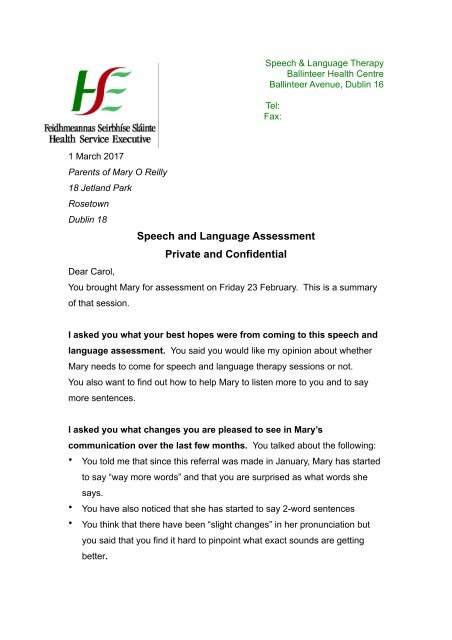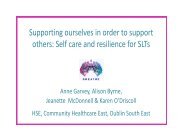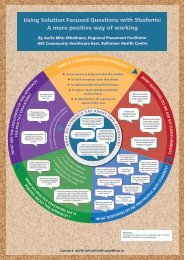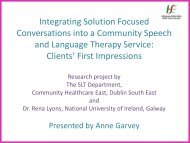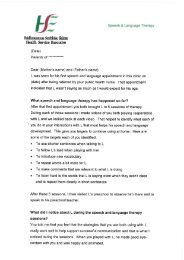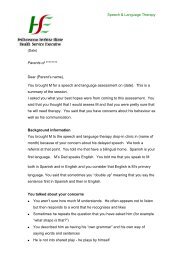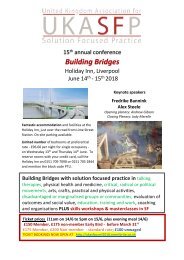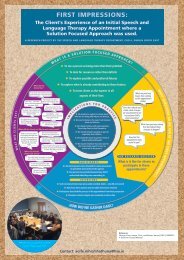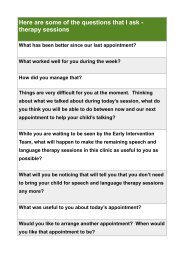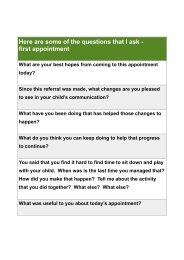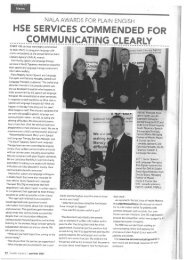SLT Sample assessment letter Plain English
Create successful ePaper yourself
Turn your PDF publications into a flip-book with our unique Google optimized e-Paper software.
Speech & Language Therapy<br />
Ballinteer Health Centre<br />
Ballinteer Avenue, Dublin 16<br />
Tel:<br />
Fax:<br />
1 March 2017<br />
Parents of Mary O Reilly<br />
18 Jetland Park<br />
Rosetown<br />
Dublin 18<br />
Speech and Language Assessment<br />
Private and Confidential<br />
Dear Carol,<br />
You brought Mary for <strong>assessment</strong> on Friday 23 February. This is a summary<br />
of that session.<br />
I asked you what your best hopes were from coming to this speech and<br />
language <strong>assessment</strong>. You said you would like my opinion about whether<br />
Mary needs to come for speech and language therapy sessions or not.<br />
You also want to find out how to help Mary to listen more to you and to say<br />
more sentences.<br />
I asked you what changes you are pleased to see in Mary’s<br />
communication over the last few months. You talked about the following:<br />
• You told me that since this referral was made in January, Mary has started<br />
to say “way more words” and that you are surprised as what words she<br />
says.<br />
• You have also noticed that she has started to say 2-word sentences<br />
• You think that there have been “slight changes” in her pronunciation but<br />
you said that you find it hard to pinpoint what exact sounds are getting<br />
better.
I asked you what you have been doing that has helped Mary to make<br />
that progress. This is what you told me:<br />
• You don’t correct Mary any more. You said that you read on the internet<br />
that it is better to repeat words clearly after her so you do that instead.<br />
You have noticed that she is much less frustrated since you stopped<br />
correcting her.<br />
• You keep your sentences short. You find this works very well when you<br />
are looking at books together because Mary loves books.<br />
• You try and spend some one-to-one time with Mary. This is hard because<br />
you have 2 other small children. However, you have found that around<br />
11am is good when the twins are having their nap.<br />
What did I do?<br />
I spent most of the session getting information from you about Mary. I also<br />
observed Mary as she played with you. Here is what I noticed.<br />
Receptive Language: This means a child’s ability to understand what other<br />
people are saying. This includes the understanding of words, concepts and<br />
grammar. Mary’s receptive language is:<br />
✔<br />
appropriate for age<br />
delayed for age<br />
needs to be monitored<br />
You are confident that Mary understands what you say to her. During the<br />
session she seemed to respond very appropriately to what you and I said to<br />
her.<br />
Expressive Language: This means a child’s ability to use words meaningfully<br />
and to join words to make sentences, tell stories and to express his/her needs<br />
to others. Mary’s expressive language is:<br />
✔<br />
appropriate for age<br />
delayed for age<br />
needs to be monitored
During the session I heard Mary use lots of single words to name things she<br />
was playing with (for example “spoon” “water”) and to describe (for example<br />
“big”, “dirty”). I also heard her say some 2 word sentences (for example “me<br />
home” “baba bed”). From what you told me and from what I observed it<br />
seems that Mary’s sentences are shorter than what I would expect for her<br />
age.<br />
Speech (pronunciation): this means a child’s ability to say speech-sounds<br />
and to use those sounds clearly in words and sentences. Mary’s speech is:<br />
✔<br />
appropriate for age<br />
delayed for age<br />
needs to be monitored<br />
Mary is harder to understand than I would expect for her age.<br />
Social Communication: This means a child’s overall ability to understand<br />
and use words, gestures and facial expression to communicate. It also<br />
includes being interested in interacting with another person, making eyecontact,<br />
taking turns and listening. Mary’s social communication skills:<br />
✔<br />
appropriate for age<br />
delayed for age<br />
need to be monitored<br />
You told me that Mary wants the same activities all the time (lego, car/<br />
garage). You have noticed that she plays with them the same way all the<br />
time. I found it hard to get her attention but then I noticed that she loved the<br />
bubbles and was very happy for me to join in that activity with her.<br />
I also noticed that she seemed to be doing nice “pretend” play with you.<br />
Summary:<br />
Mary is 2 years 10 months old. She has an expressive language delay. This<br />
means that her sentences are shorter than I would expect for her age.
Her speech-sounds are also delayed. That means that she is harder to<br />
understand than I would expect for her age. She is able to say individual<br />
speech-sounds but has difficulty saying those sounds in words. You told me<br />
that you are a bit worried about her attention and her play. That wasn’t<br />
immediately obvious to me during the <strong>assessment</strong> session but I will keep an<br />
eye on it when you bring her for some speech and language therapy<br />
sessions.<br />
It is possible that Mary will need some direct work at a later date to help<br />
improve her speech-sounds. However, first it will be more useful to help the<br />
development of her expressive language. This means that we will look at<br />
ways to help her sentences to get longer.<br />
What happens next?<br />
I will contact you in the next few weeks to arrange some sessions for you and<br />
Mary. In each of these sessions we will make a 3 minute video of you and<br />
Mary playing together. We will then look back on the video together to see<br />
what you are doing that seems to help Mary say longer sentences. You can<br />
then focus on doing that even more at home.<br />
Once Mary’s vocabulary grows and her sentences get longer, we can decide if<br />
we need to work on her speech sounds more directly.<br />
I hope that I have correctly written everything that you told me. Let me know if<br />
I haven’t. If you have any questions about this report feel free to phone or<br />
email me.<br />
Yours sincerely,<br />
Senior Speech and Language Therapist<br />
Ballinteer Health Centre<br />
! !01 ******* (Wednesday – Friday) ! *****.******@hse.ie<br />
!


